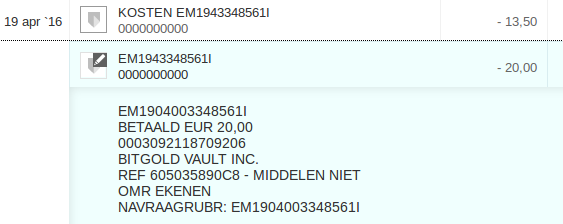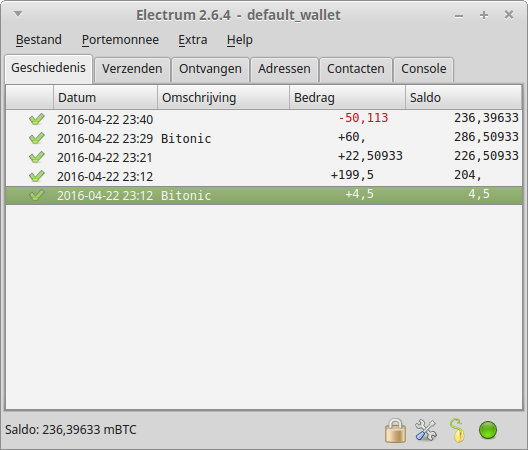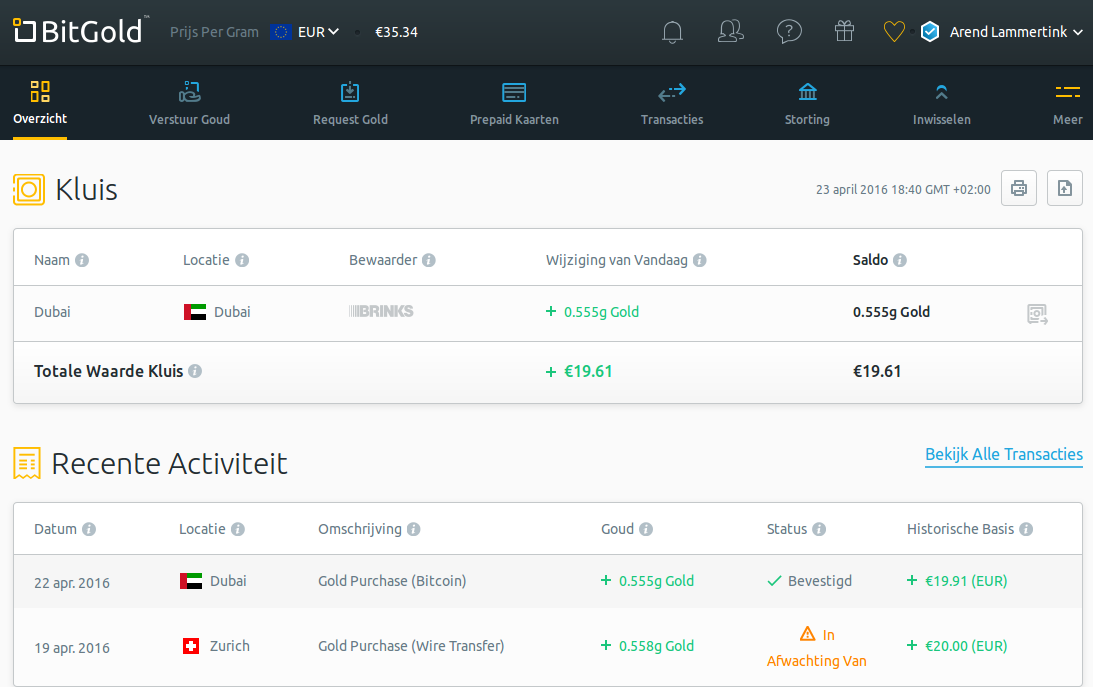A real-life example of the usefulness of BitCoin: acquiring BitGold

By Arend Lammertink. April 23d, 2016.
BitGold offers the possibility to save in gold in small quantities, which is a very nice feature. In practice, however, this is not attractive at all outside Canada, because the cost of international wire transfers can be as much as 60% or more for small amounts. Since it is also possible to buy BitGold with BitCoin, I decided to give that a try, to see how the two methods measure up. The conclusion is that for this application, BitCoin wins hands over fist. It is both much faster and much cheaper.
BitGold
While the name suggest this is some kind of virtual currency connected to BitCoin, it actually is a sophisticated gold vaulting facility, which allows one not only to acquire allocated gold in small quantities, but also to wire it to other BitGold holders and even to spend it with a pre-payed card much like a credit card. All in all, this is a wonderful service to the precious metals community, although one can only save in gold and not in silver.
With their web platform, they essentially create a 100% gold backed digital currency, which is a great idea that stands or falls with the trustworthiness of the people behind the company. The parent company of BitGold, GoldMoney, was founded by James Turk, Roy Sebag, and Josh Crumb. Investors and backers include Eric Sprott, Albert D. Friedberg, George Soros, Adam Fleming and Canadian Banks Canaccord Genuity. And they have a research portal, GoldMoney Insights, which is led by Alasdair Macleod, Stefan Wieler, John Butler, James Turk, and Joshua Crumb.
Quite a lot of these people are well known within the precious metals community, so when these people are involved with this, I know I can trust this company to have actually allocated the gold they are the custodian for, which is much more than I can trust a bank. After all, it is a fact that banks work on the "fractional reserve" principle, which means that I am certain that the vast majority of funds held at a bank account is not backed by anything, not even by paper notes or deposits at a central bank.
All in all, BitGold is a very interesting concept which has a lot of potential for the future. For me personally, at this moment, the most interesting feature is to be able to save in gold in small quantities. With bank wire transfers, however, the cost are that high, that this is not attractive at all.
BitCoin
BitCoin is a totally different animal than BitGold. Strictly speaking, it is not money, because, at least at this moment, it is not a store of value which stood the test of time, like gold or silver. While you can print a BitCoin on paper, you cannot expect that when bury a printed BitCoin in your garden, it will still retain any value when your great-grandchildren unearth your BitCoin 500 years from now. It is also not a fiat-currency, because no one forces you to use or accept BitCoin. And it distinguishes itself from Government fiat currencies in that only a limited amount of coins will be created, so no central banker can fire up the BitCoin printing press when they run out of currency. I won't go further into further details here, I did that a while ago already.
All in all, BitCoin is a strange blend of on the one hand being a non-backed currency and on the other hand being scarce like money which is backed by tangible goods such as precious metals. In that sense, it is a unique concept, and it seems that you either love it or hate it. But whatever you may think of it, it is a useful tool for performing international transactions cheaply in this day and age. So, let's see how it holds up against a wire transfer from my bank account to my BitGold account.
BitCoin vs ABN AMRO
Last week, I talked with a friend who wanted to transfer some of his savings into gold, but he did not like the idea of purchasing coins, so he thought about buying some ETFs. For silver, the Admiral's PSLV is an option, but in the end one still relies on "the system" to be able to sell your holdings. Sure, you can redeem the physical, but that is quite a hassle, I reckon. So, to me it is a really nice vehicle for adding physical exposure to your portfolio, but is not an insurance against a collapse of "the system".
Then I thought about BitGold, which operates completely outside of the banking system. There is no middle-man, which makes it much safer than holding ETFs. And so it happened that I decided to play a bit around with it, to see how it works and how to transfer funds into a BitGold wallet.
I started out with validating my account with my passport and decided to transfer EUR 20 into bullion, choosing the vault in Zurich, because I can travel there if need be. It was quite challenging to type in all the required account numbers in the bank's web portal, but it seems to have worked, although I had to pay no less than 67.5% wire transfer costs as you can see on the following screen shot:

As you can see, I made the payment at Wednesday, April 19th. Of course, I checked a few times whether or not all went as it should, but Friday evening still no confirmation. Needless to say, if this would have involved a substantial amount of currency, I would have been getting a bit nervous by now.
Either way, I decided to try the BitCoin route as well. After all, BitGold offers that possibility, so why not try it out?
In order to do that, I needed a BitCoin wallet on my computer. I used the original BitCoin application a few years ago and I still owned like 0.2 BTC. This application, however, downloads the complete transaction database to your computer, which is about 20 GB in size. Also, one has to be very careful not to loose one's "wallet.dat" file, because without that, your BitCoins are gone. All in all, this application is not really comfortable to work with, but it works.
After some searching, I settled for Electrum, which does not need to download a lot of data and one can also write down a rather long pass phrase, called a "seed", with which you can always retrieve your BitCoins in case something happens to your computer. The nice thing about Electrum is that it keeps all your sensitive data on your own computer, so one does not have to trust any third party as with a web-based wallet.
After transferring my old BitCoins to Electrum, I was ready to test the BitCoin route to Dubai. I went to Bitonic and bought 0.06 BTC, for which I payed EUR 24.75 on Friday, April 22nd at 23:28. The BitCoins arrived in my Electrum Wallet at 23:29. I then proceeded to transfer 0.05 BTC to BitGold, 11 minutes later to be exact, as can be seen in this screenshot:

The BitCoins are denominated in mBTC, or one-thousandth of a BTC. As you can see, I payed a small transaction fee of .113 mBTC, about 0.23% of the amount transferred to BitGold. The transaction to BitGold worked flawlessly. I just copied the BitCoin address BitGold gave me into the "send" form on the wallet application, typed the amount of BTC to be transferred and within a few seconds after I clicked "OK", BitGold received the currency just like that and I knew the payment transaction had already been completed, which I could also see in my BitCoin wallet application. The actual gold transfer was still "pending", of course, but that was because BitGold needs some time to allocate the gold in their vault and had nothing to do with the payment transaction.
The next day, Saturday 23d, I checked my BitGold account to see that the BitCoin transfer was already complete, while the bank wire transfer is still somewhere on it's way. Hopefully, that is:

To add it all up: I bought 0.06 BTC for EUR 24.75, or EUR 409.50 per BTC. So, the 50.113 mBTC I payed to BitGold costed me EUR 20.52, for which I received 0.555 grams of gold, valued at EUR 19.61.
In other words, all the conversion and transaction fees for the BitCoin route added up to EUR 0.91, about 4.6%, including the 1% transaction fee from BitGold.
Conclusion
For this particular kind of transaction, the international transfer of a small amount of currency, the BitCoin route is vastly more efficient than a wire transfer by bank. Transaction costs for the BitCoin route amounted to just 4.6% compared to over 67.5% for wire transfer by bank, which is almost 15 times as much! And the BitCoin transfer + BitGold confirmation completed in a matter of hours, while the bank transfer route is still pending after four days.
Final words
Should you wish to open a BitGold account, please use this link. That way, you get a discount on your first deposit and I get a small bonus.
Update Oct, 30, 2017.
As for the transfer by bank,
http://www.youtube.com/watch?v=_nVk25ZvTkU
-- Arend --
